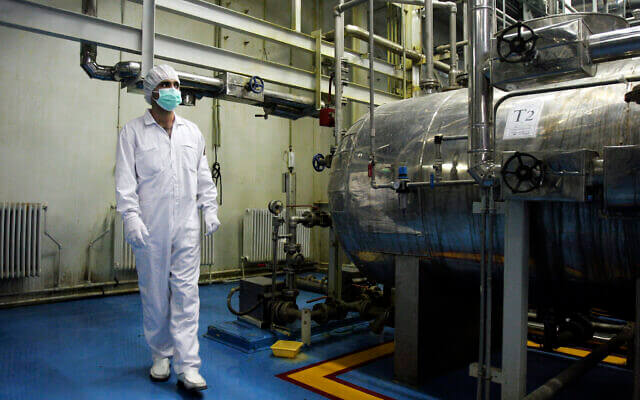Iran has begun enriching uranium to 60% at the underground Fordow nuclear facility for the first time in retaliation to the “anti-Iran” resolution adopted by the International Atomic Energy Agency (IAEA) last week, the Atomic Energy Organization of Iran (AEOI) said on Tuesday.
The AEOI claimed that the country has also increased 60% enriched uranium stockpiles at the Natanz nuclear site, where Iran began enriching uranium up to 60% a year ago. It said the decision will add to Iran’s growing stockpile of 60% enriched uranium.
Furthermore, the agency said it installed a “new generation” of advanced IR-6 centrifuges at Fordow, without specifying a number, to enable a “massive ramp-up in output.” According to the state-owned Fars News, Iranian officials have vowed to retaliate against the “politically motivated” IAEA resolution.
Iran also has informed Agency it wants to build a new enriched uranium production building at Natanz which it will fill with 100 cascades. (That's 1,660 machines folks.) All this runs in the direction of long-time Khamenei industrial-scale nuclear fuel production desire. BUT-3-
— laurence norman (@laurnorman) November 22, 2022
According to the IAEA, the move will enable Iran to further shorten the time required to convert the 60% enriched uranium to the minimum weapons-grade level of 25 kilogrammes (kgs) of 90% enriched uranium required to manufacture one nuclear bomb. In September, the UN nuclear watchdog reported that Iran has enriched enough 60% uranium to produce a bomb in a matter of weeks.
Additionally, the IAEA said earlier this month that Iran has increased its total stockpile of 60% enriched uranium from 62.3 kgs to almost 70 kgs since the end of September.
Iran’s latest decision follows a resolution adopted by the 35-member IAEA Board of Governors last week censuring Tehran for refusing to allow IAEA inspectors to conduct a probe into the discovery of undeclared uranium traces at several nuclear sites.
The resolution—drafted by the United States (US), the United Kingdom (UK), France, and Germany drafted the resolution and voted for by 26 countries—said it is “essential and urgent” that Iran comply with the investigation “without delay” and called on Tehran to explain the source of the uranium traces.
It also blamed Tehran for delaying talks to revive the 2015 nuclear deal (JCPOA), which the United States abandoned under President Donald Trump in 2018.
Iranian Foreign Ministry spokesman Nasser Kanaani condemned the resolution, calling it Western propaganda against Iran. Kanaani later said the IAEA has become an instrument of the West against independent nations. He promised that Tehran will never give in to the pressure exerted by the West and will take retaliatory measures.
🇮🇷 #Iran has started enriching uranium to 60% purity at its underground Fordow nuclear site, state media has reported.
— FRANCE 24 English (@France24_en) November 22, 2022
Media described the action as a response to the UN #nuclear watchdog's demand for more cooperation from #Tehran.@SayahTweets with more analysis ⤵️ pic.twitter.com/SFStA2rPGd
In June, the IAEA’s board of governors passed a resolution—drafted by the US, the UK, France and Germany—condemning Iran’s refusal to allow a probe. Tehran retaliated by dismantling 27 IAEA cameras in nuclear facilities across the country. Additionally, it announced a series of steps aimed at further accelerating its nuclear programme and even threatened to stop cooperating with the agency entirely.
The West has said that reviving the JCPOA depends on Iran’s willingness to allow an investigation. Tehran, on the other hand, continues to insist that the IAEA drop the investigation. The dispute over allowing the IAEA to investigate the undeclared uranium traces has thus stalled talks to revive the JCPOA, which have been going on since April 2021.

